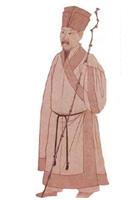Su Tung-po
Su Tung-po Poems
The Yangtze flows east
Washing away
A thousand ages of great men
West of the ramparts --
...
Families, when a child is born
Want it to be intelligent.
I, through intelligence,
...
Will a moon so bright ever arise again?
Drink a cupful of wine and ask of the sky.
I don't know where the palace gate of heaven is,
Or even the year in which tonight slips by.
...
A fragment moon hangs from the bare tung tree
The water clock runs out, all is still
Who sees the dim figure come and go alone
Misty, indistinct, the shadow of a lone wild goose?
...
Like a flower, but not a flower
No one cares when it falls
And lies discarded at the roadside
But though
...
Su Tung-po Biography
Born in 1036, Su Tung-po was a famous Chinese poet. He was also called Su Shih. Born in present-day Sichuan province, Su was from a literary family. During the Sung Dynasty he wrote very simple poems based on Buddhist Philosophy. Su occupied many official posts, rising to president of the board of rites (which regulated imperial ceremonies and worship). He designed the parks surrounding Lake Si in Hangzhou. Five emperors came to the throne during his lifetime. Su’s poetry and art were inspired by Taoism and Buddhism, although his political views were founded in Confucian philosophy. Su is generally considered the greatest poet of the Sung dynasty. He is also noted for his fu, satiric poems which approach free verse, and for letters and essays. Although his writings were once blacklisted, even destroyed, his genius could not be repressed. His poetry and writing have been reprinted, studied, and enjoyed by generations since. His satiric verses and opposition to official policies frequently lost him his official status and resulted in imprisonment and 12-times exiled. Su's tumultuous career began around 1079, when he wrote a satirical poem on the New Policies promoted by Prime Minister Wang An-shih, who was infuriated and had Su arrested. Su served time in jail and was later released, but the following year he was banished to Huang-chou in the southern hinterlands. This proved to be a major turning point in his life. Beforehand, Su was a free and spirited personality, and his poetry was full of insight and energy. However, having barely escaped with his life and being banished to the harsh region of the south, he began to reflect on the beauty of nature and the meaning of life. In exile, he enjoyed the simple pleasures of farming and writing, taking joy in what life had to offer. In fact, many of his most popular works were done at the time. Though Su was later pardoned, he was never far from controversy. Even as an old man, he was banished to the furthest reaches of the land--Hainan Island in the South China Sea. The experience, however, only further enlightened him. Though pardoned once again, this time he did not make it back to court and died on the trip north.)
The Best Poem Of Su Tung-po
Remembrance
To what can our life on earth be likened?
To a flock of geese,
alighting on the snow.
Sometimes leaving a trace of their passage.
Su Tung-po Comments
" I gaze at my loved one in a corner of the sky" by Su Tung-p-'o' I would like to see this text in Japanese characters

Su Tung-po is not just very good at literature and poems writing, but also good at playing Chinese traditional instrument, food inventions, etc. We will always remember the spirit which he trying to put in the poems.